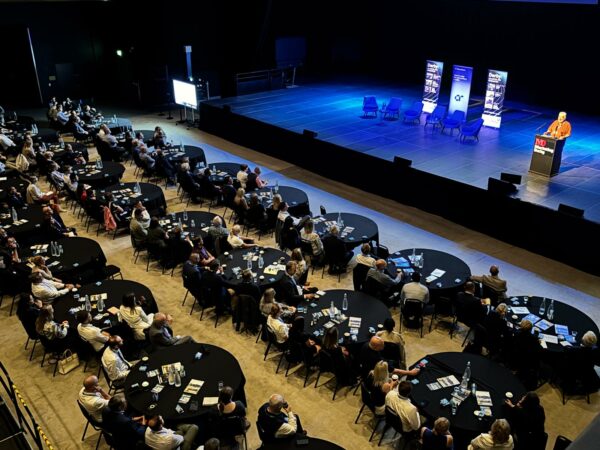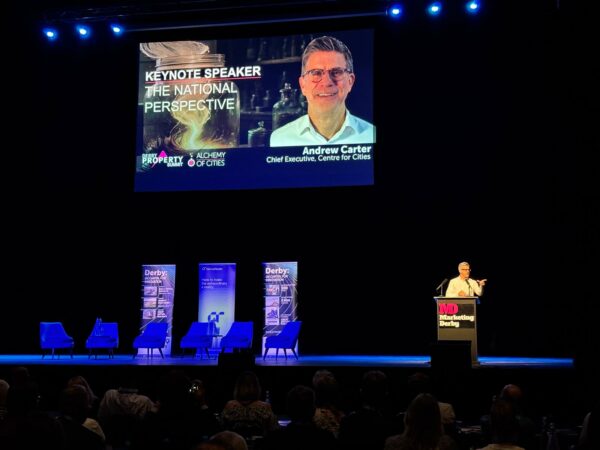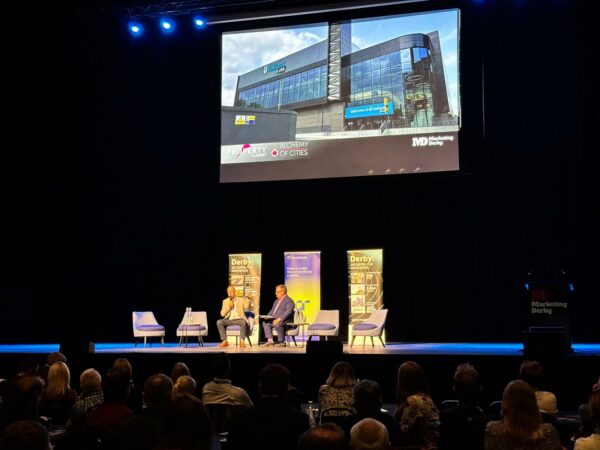Latest News | 10 November 2021
The sky’s the limit for Derby at latest London Embassy
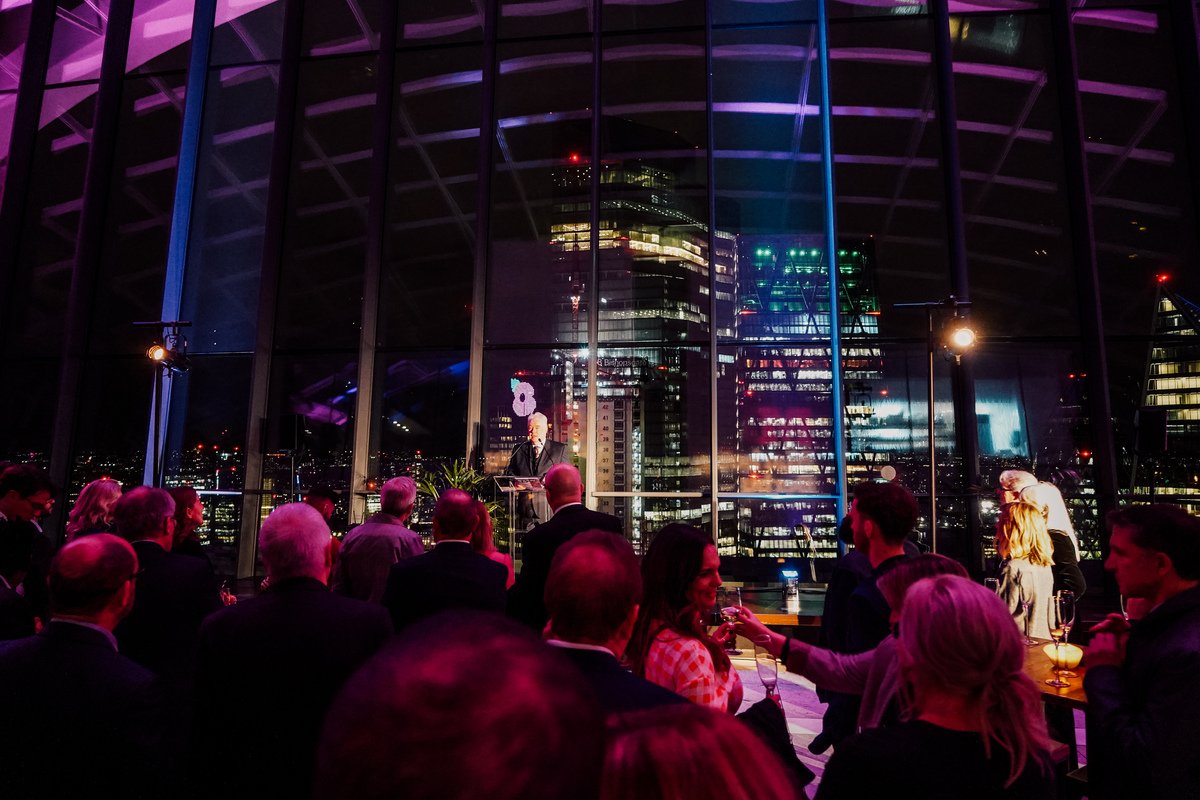
When it comes to investment momentum, Derby is walking the walk and talking the talk.
That was the message given to the audience at Marketing Derby’s London Embassy, held at an iconic building in the capital nicknamed ‘The Walkie-Talkie’.
Last night, more than 100 guests, including investors, ambassadors and Bondholders, gathered at the Sky Garden, on the top floor of the central London building, to hear how investments and regeneration in Derby and Derbyshire were continuing at pace – despite the pandemic.
Paul Simpson, chief executive of Derby City Council, who was among the keynote speakers, said: “Since the start of the pandemic, we have attracted £280 million of public cash to support a number of major projects.

“We have achieved a huge amount – but we are not going to get complacent – and we are not going to stop and rest on our laurels. Derby is open for business!”
Amid the spectacular backdrop of London’s night skyline, the embassy heard how despite the challenges posed by the coronavirus pandemic, Derby had shown resilience, with a number of key regeneration projects in the city progressing unabated.
Ahead of the keynote speeches, attendees to the event, which was the first held since Marketing Derby won the Queen’s Award for Enterprise in Innovation, were welcomed on the door by the leader of Derby City Council, Councillor Chris Poulter and Lisa Richards, deputy chair of Marketing Derby.
After a few words of welcome by John Forkin, managing director of Marketing Derby, Derby North MP Amanda Solloway gave a speech in which she praised the spirit of togetherness shown by the city in the face of adversity.
She said: “In Derby we have the most amazing ambition, for example, the bids for City for Culture and to attract the Great British Railways headquarters.
“During the pandemic, Derby showed great resilience. We pulled together as a city. It is a city with a heart.”
Among the businesses who have proceeded with their investments in the city is engineering giant Rolls-Royce.
Earlier this year, it started using its brand new £90 million test bed, created at its civil aerospace division, in Sinfin, which will be used to test aero engines of the present and future – while also carrying out work on Sustainable Aviation Fuels.

This week, the company announced it had raised almost £200 million in private equity funding to create a new business – Rolls-Royce Small Nuclear Reactor (SMR), which will deliver low cost, low carbon, mini nuclear power stations.
Securing the cash unlocks a further £210 million of UK Research and Innovation funding.
Keynote speaker Patrick Horgan OBE, director of global governance relations at Rolls-Royce, told the embassy event that the company was proud of its association with Derby.
He said: “Covid accelerated our push to develop sustainable technology, which had already been initiated. In recent months, we have announced a number of important projects – Derby is central to all of these things.
“The company contributes £1 billion to the local economy and employs a large amount of people. Derby is home to a large proportion of our research and development. In short, we like Derby.

“We are proud of our association with the city – and hope that we give Derby something to be proud of.”
Another key investor for the city is the University of Derby. It has an ambition to have a greater physical presence in the heart of the city – part of its ongoing commitment to the inclusive and regenerative growth of Derby.
Recently, the university unveiled its vision to build a new, iconic business school, in the heart of the city. Set to open in September 2024, the building is projected to be the study base for over 6,000 students by 2030.
Backed by a number of key businesses, the university has also teamed up with Derby College Group, together with Loughborough College and Loughborough University, to bid to create a £13 million East Midlands Institute of Technology.
It would be designed to produce the highly advanced workforce needed to lead the digital revolution.
Speaking at the Embassy, Professor Kathryn Mitchell, vice-chancellor of the University of Derby, said: “We are a civic university, and I am proud to play a role as a civic leader.
“We are an epicentre of knowledge and learning, one which we will continue to invest heavily in.”
Finally, Paul Simpson took to the stage to give examples of major schemes, which are currently on-site – such as the £200 million Becketwell and £100 million Castleward regeneration projects, not to mention the 800-home Nightingale Quarter scheme on the site of the former Derbyshire Royal Infirmary.
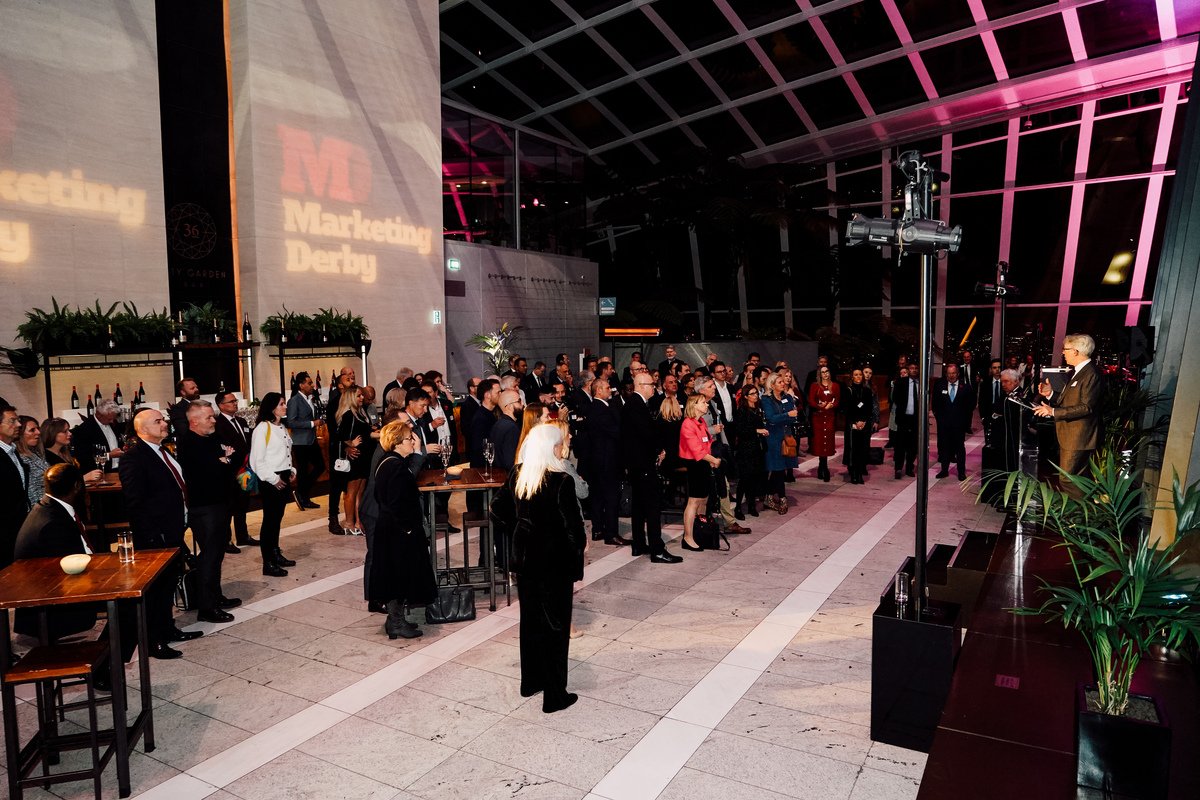
He outlined how Derby was attracting quality investors, with Grainger Plc funding the first phase of the Beckwell scheme – and ASM Global being appointed to operate a new performance venue, which represents the second phase of the scheme.
He also cited Cale Street taking full ownership of the former Intu Derby shopping centre, now rebranded as Derbion, as another key example.
He went on to explain how more major projects were on their way, such as SmartParc SEGRO Spondon, a huge state-of-the-art high-tech food manufacturing and distribution campus, which will be built across 1.85 million sq ft and eventually employ 5,000 people.
He also spoke about the South Derby Growth Zone, which recently received confirmation in the Budget of a £50 million boost from the Government’s Levelling Up Fund.
Finally, Mr Simpson spoke about Derby’s ambitions going forward, including its ongoing bid to become the UK City of Culture 2025 – and to be the new headquarters of the planned Great British Railways.
He said: “Derby is the home of the UK rail industry. The GBR headquarters has to be in Derby, and we will be pressing hard to get that in our city.
“As a city, we may not be the biggest – but we are the best!”
